Sustainable Fashion Week challenging industry's footprint
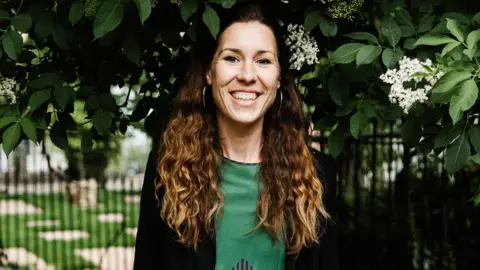 Sustainable Fashion Week
Sustainable Fashion WeekAs London Fashion Week (LFW) showcases some of the UK's biggest designers, an alternative event has been challenging the environmental impact of the fashion industry.
Sustainable Fashion Week (SFW) comprises a catwalk show, workshops and talks promoting their ethos of "re-wear, repurpose, regenerate and reconnect", taking place around the same time as its London counterpart.
Organised in Bristol, it also has more than 80 community events happening across the UK from 16-25 September, as well as a couple in Nigeria and Australia.
London Fashion Week, which has been running from 16-20 September, rearranged its schedule to move catwalk shows from the day of the Queen's funeral and cancelled its usual parties.
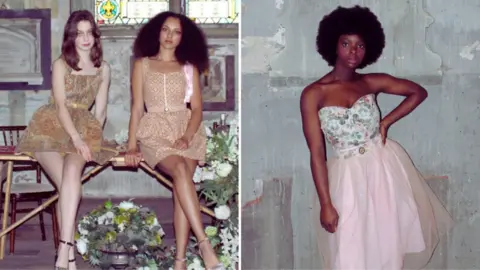 Maria Loria
Maria LoriaSFW founder Amelia Twine said a big aim of the week was to bring the "joy" back into sustainable fashion.
"There's a lot of pleasure in buying things that are new, but when we try to change that narrative to be around using materials and clothing that's already in circulation, I think some people feel like the joy and the pleasure is taken out of that."
The fashion industry is responsible for 8-10% of global emissions, according to the UN - more than the aviation and shipping industries combined.
Ms Twine was working in the food industry when she noticed fashion was "just so far behind" other industries in terms of addressing its environmental impact.
She set up a sustainable womenswear brand in 2018 but soon realised the price of new, sustainable fashion excluded a lot of people, inspiring her to launch SFW.
"It's not about looking at aspiration or exclusivity or new trends, but looking at how everybody can engage with sustainability and fashion in a way that works for them," she added.
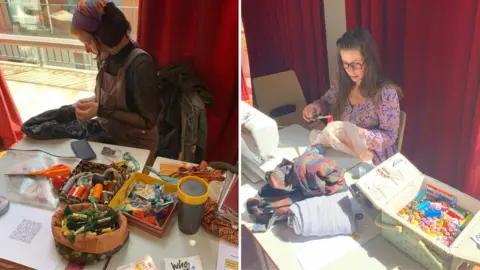 Sustainable Fashion Week
Sustainable Fashion WeekMost of fashion's environmental impact comes from the use of raw materials, such as the farmland used to grow cotton and the amount of oil needed for synthetic materials like polyester.
The exploitation of garment workers in both the UK and overseas factories has also been further exposed in recent years.
More affordable
This year marks the second Sustainable Fashion Week, but the first time it has hosted a catwalk.
Designer Maria Loria, who is producing one of the catwalk looks, wants to show it can be affordable to consume sustainable fashion, "as opposed to giving all of our money to these big fast fashion corporations that are killing the planet and and exploiting workers".
She hopes the 20 "accessible looks" she has curated from vintage, preloved and upcycled items will help people to think about how they can "reimagine" their wardrobe.
Other catwalk looks are being designed by local fashion students, campaign group Black 2 Nature and national fashion retailer Lucy and Yak.
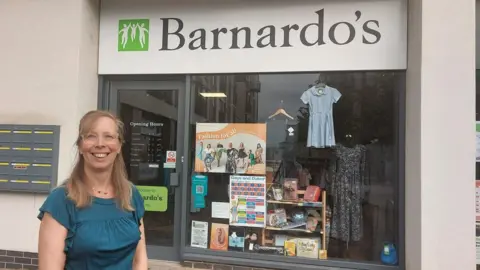 Karen Edkins
Karen EdkinsOne community event is the Lockleaze Fashion Show on 20 September at Trinity School in Bristol, being run by the local Barnardo's charity shop.
Store associate Karen Edkins said the charity lost a "significant amount of income" during the pandemic; around £1.3m for every week the shops were closed.
They are hoping the fashion show, made up entirely of second-hand garments, will encourage more fashion-lovers to use charity shops for "sustainable and great value clothes".
"Shopping pre-loved in charity shops extends the life of textiles and homeware, reduces carbon, waste, and water footprints," added Mrs Edkins.
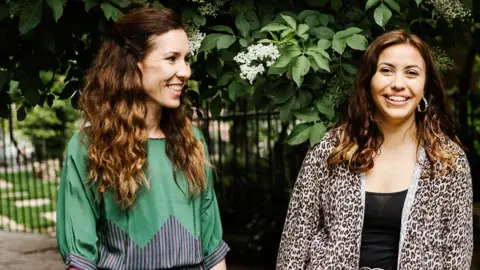 Sustainable Fashion Week
Sustainable Fashion WeekMs Twine hopes attendees will walk away from SFW feeling "empowered to make positive changes" to their relationship with fashion.

SFW's tips for embracing sustainable fashion
- Repair and regenerate your old clothes
- Buy second-hand
- Go to or organise clothes swaps
- Rent items for special occasions
- Try to avoid synthetic fibres - buy organic and natural fibres where possible
- Try to avoid fast-fashion trends and brands

Follow BBC West on Facebook, Twitter and Instagram. Send your story ideas to: [email protected]
